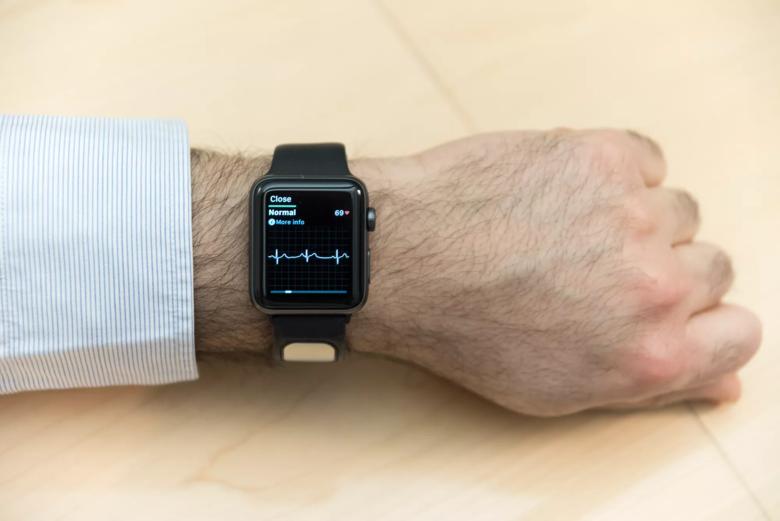Cleveland Clinic News Service | 216.444.0141
We’re available to shoot custom interviews & b-roll for media outlets upon request.
CCNS health and medical content is consumer-friendly, professional broadcast quality (available in HD), and available to media outlets each day.

Can wearable devices detect abnormal heart activity?
The answer is “Yes,” according to a recent Cleveland Clinic study that tested the efficacy of a federally-approved heart-monitoring wristband and its corresponding app. When paired with a wearable smartphone device, the technology was found to accurately identify the presence of atrial fibrillation (AFib), a heart rhythm disorder common in people over the age of 65.

Image content: This image is available to view online.
View image online (https://assets.clevelandclinic.org/transform/276977f7-4435-4151-9f1d-2de15b12c27e/kardia-band)
The KardiaBand and App.
The study of 100 AFib patients — published yesterday in the Journal of the American College of Cardiology — found when the wearable technologies detected an undetermined heart rhythm, it led to an accurate diagnosis of an AFib occurrence with 93 percent sensitivity (correctly identifying people with AFib) and 84 percent specificity (correctly identifying those without the disease). Each occurrence was reviewed and interpreted by a Cleveland Clinic electrophysiologist, who confirmed the AFib diagnosis was accurate.
When the physician directly reviewed these readings, it detected AF with 99% sensitivity and 84% specificity.
RELATED: Meet the Transplant Recipient with Same Heart for 29 Years
“Having these tools and looking at the future maybe these procedures could have been avoided to be scheduled to begin with if we had the ability of knowing that that patient is actually back in regular rhythm before we bring them to the lab.” Khaldoun Tarakji, M.D., electrophysiologist at Cleveland Clinic led the study.
Researchers added using the technology with a physician’s interpretation should improve the clinical usefulness of the data. For instance, about 8 percent of patients studied were found to have a normal heart rhythm on the day they were scheduled for cardioversion, a heart procedure.
The heart-monitoring wristband used in the study – the KardiaBand – was cleared by the U.S. Food and Drug Administration in November 17, 2017, and is available in the consumer marketplace. It is designed to be paired with an app that provides an algorithm for detecting AFib, and attaches to a wearable smartwatch as an add-on accessory.
RELATED: Out of Town Heart Patient Uses New Technology for Treatment
For the study, each participant was given a smartwatch equipped with the KardiaBand, and taught how to use it to generate the wave-pattern tracing needed for diagnosis. Patients placed a finger on a designated spot on the wristband for 30 seconds, with the smartwatch algorithm instantly determining if the heart rhythm was normal, indicative of AFib or undetermined.
RELATED: Best Ways to Protect Your Heart from Atrial Fibrillation
“When we compared the diagnosis made by the automated algorithm to the 12 lead physician interpreted electrocardiogram we found that the algorithm was able to detect atrial fibrillation with 93 percent sensitivity,” explained Dr. Tarakji, who noted the results indicate the technology could have wider applicability in the future.
The findings from the study are presented at the American College of Cardiology’s 67th Annual Scientific Session, in Orlando and published in Journal of American College of Cardiology.
Cleveland Clinic is a nonprofit multispecialty academic medical center that integrates clinical and hospital care with research and education. Located in Cleveland, Ohio, it was founded in 1921 by four renowned physicians with a vision of providing outstanding patient care based upon the principles of cooperation, compassion and innovation. Cleveland Clinic has pioneered many medical breakthroughs, including coronary artery bypass surgery and the first face transplant in the United States. Cleveland Clinic is consistently recognized in the U.S. and throughout the world for its expertise and care. Among Cleveland Clinic’s 82,600 employees worldwide are more than 5,786 salaried physicians and researchers, and 20,700 registered nurses and advanced practice providers, representing 140 medical specialties and subspecialties. Cleveland Clinic is a 6,728-bed health system that includes a 173-acre main campus near downtown Cleveland, 23 hospitals, 280 outpatient facilities, including locations in northeast Ohio; Florida; Las Vegas, Nevada; Toronto, Canada; Abu Dhabi, UAE; and London, England. In 2024, there were 15.7 million outpatient encounters, 333,000 hospital admissions and observations, and 320,000 surgeries and procedures throughout Cleveland Clinic’s health system. Patients came for treatment from every state and 112 countries. Visit us at clevelandclinic.org. Follow us at x.com/CleClinicNews. News and resources are available at newsroom.clevelandclinic.org.
Editor’s Note: Cleveland Clinic News Service is available to provide broadcast-quality interviews and B-roll upon request.